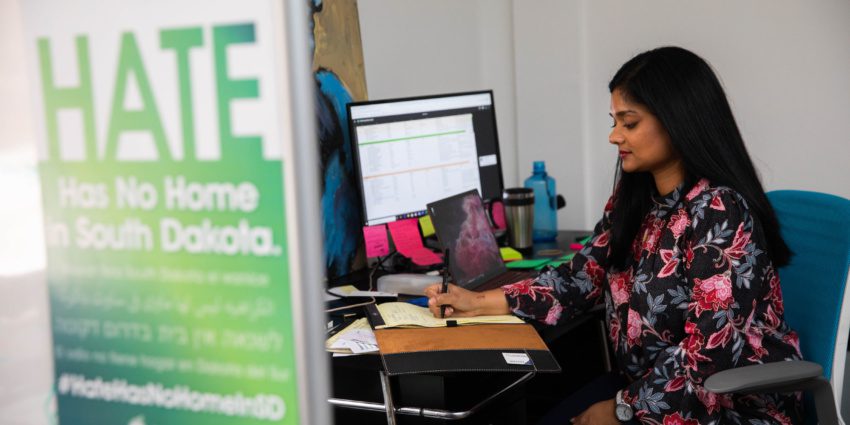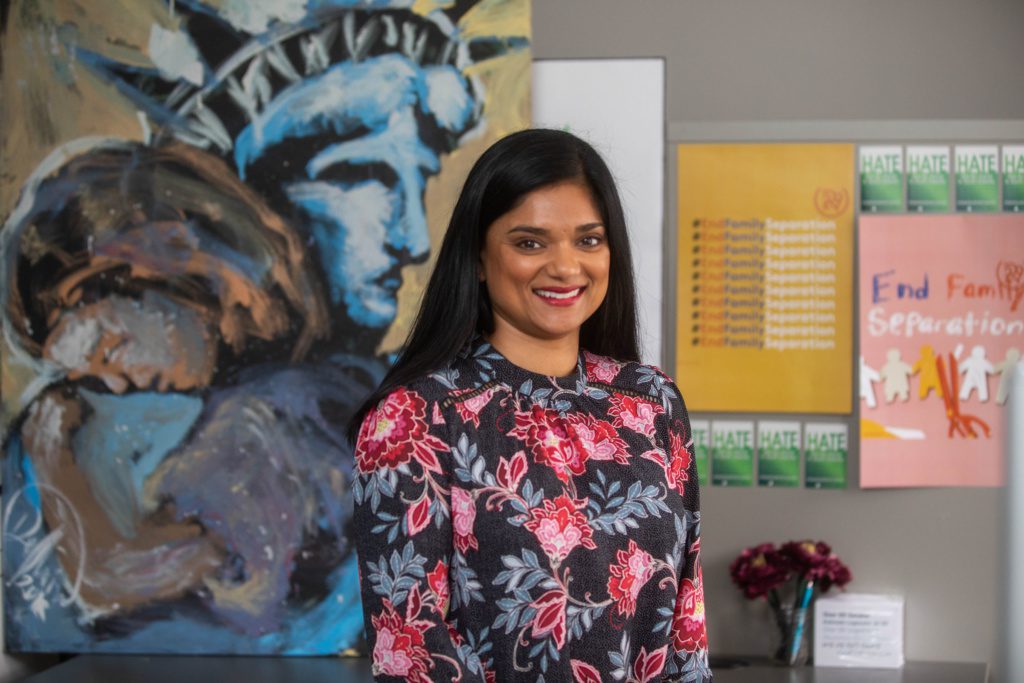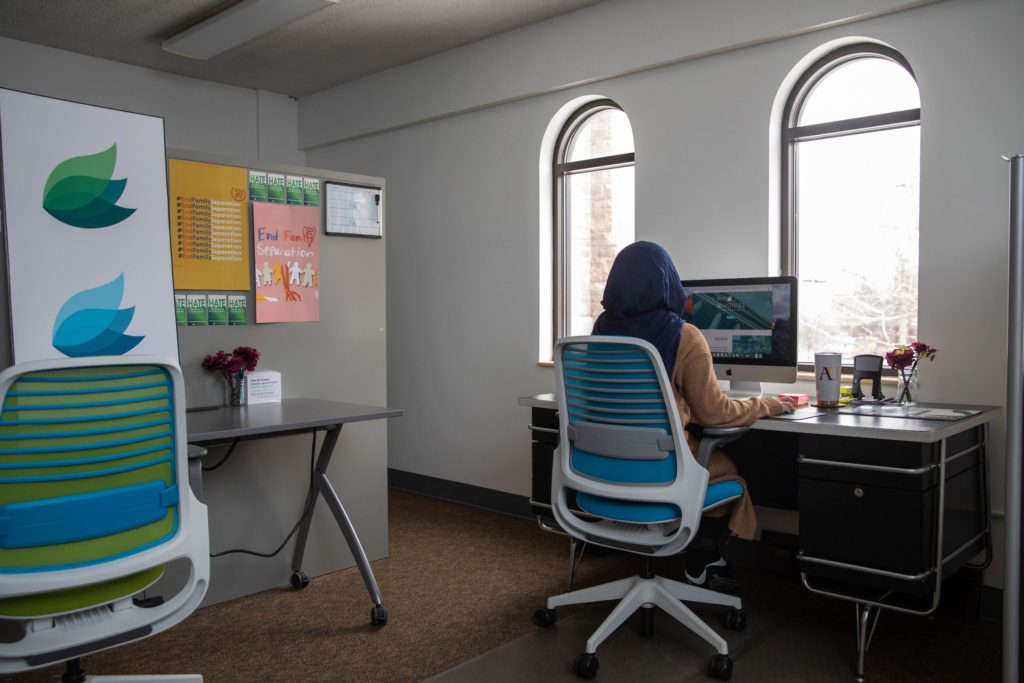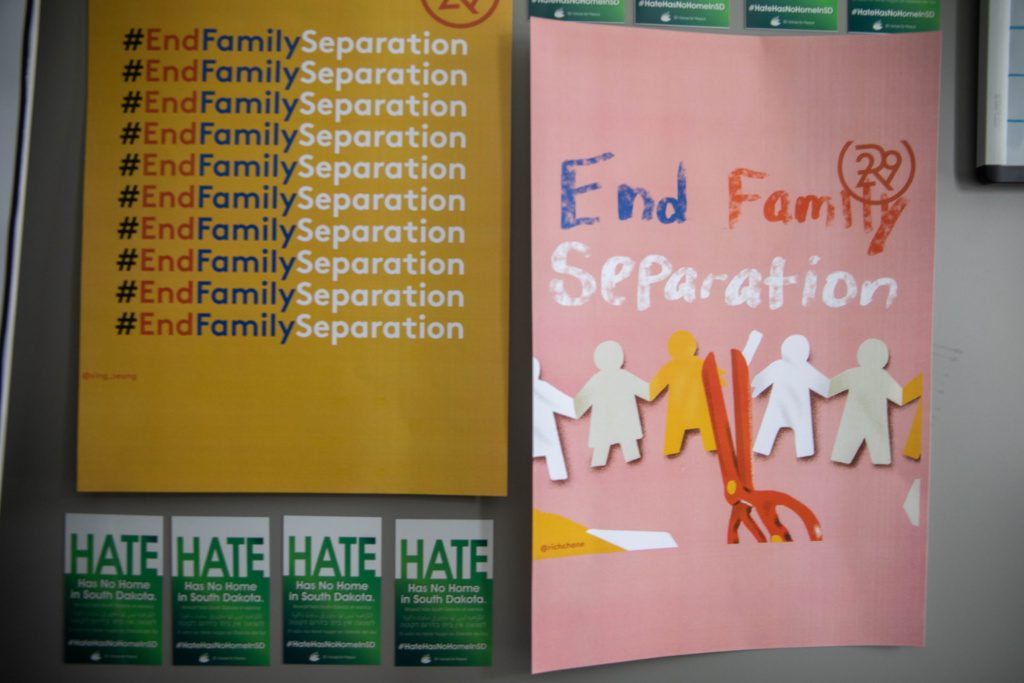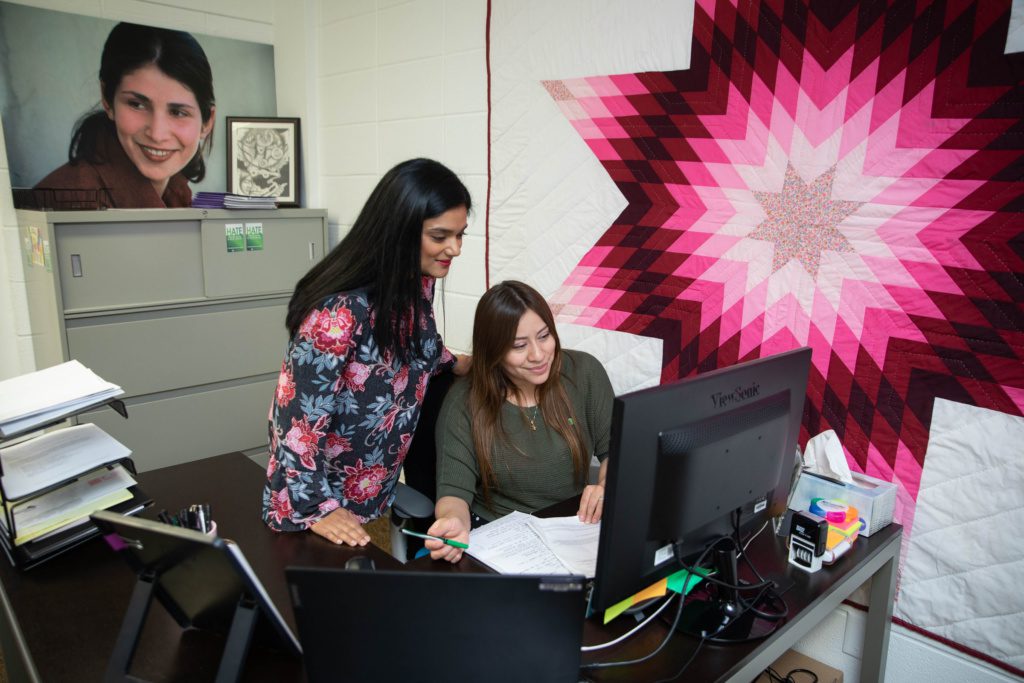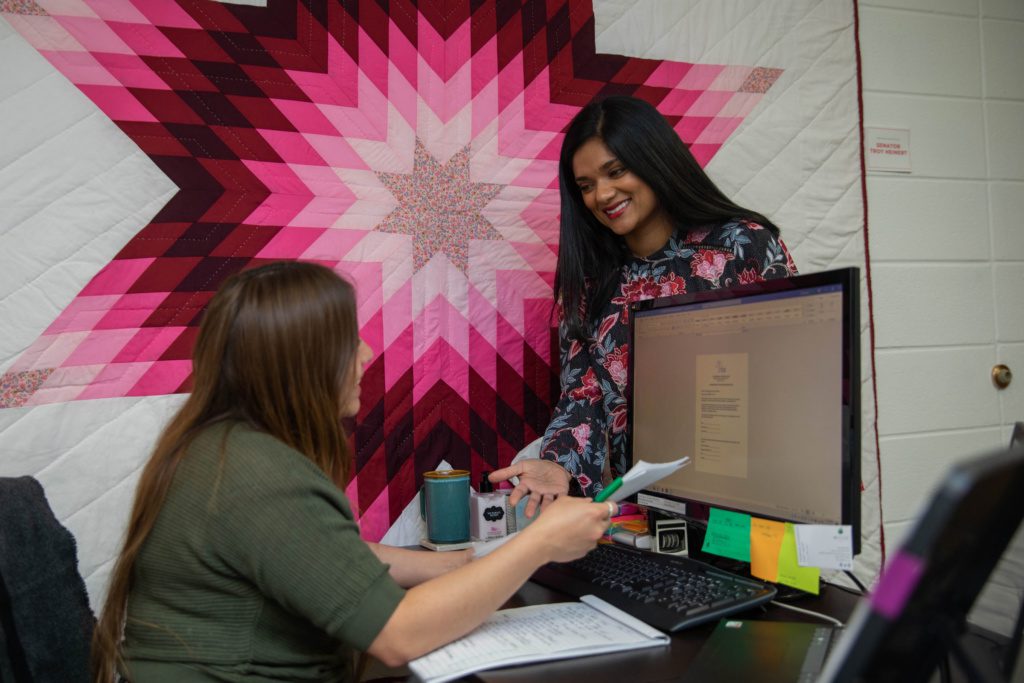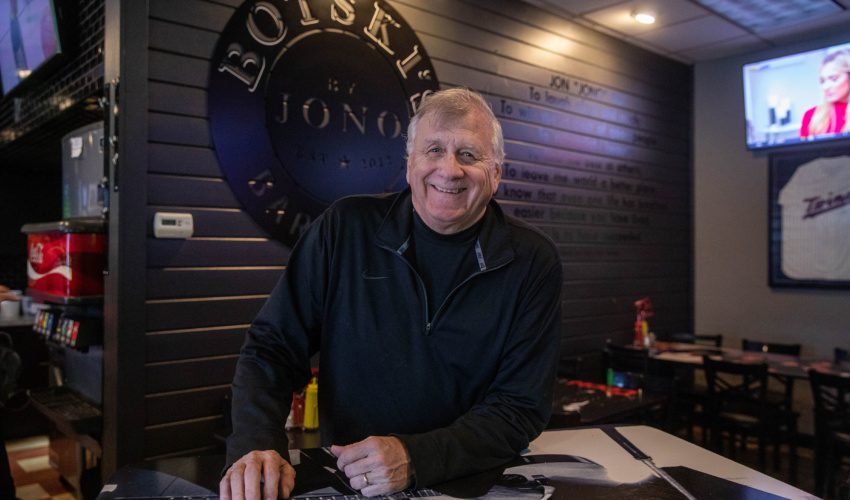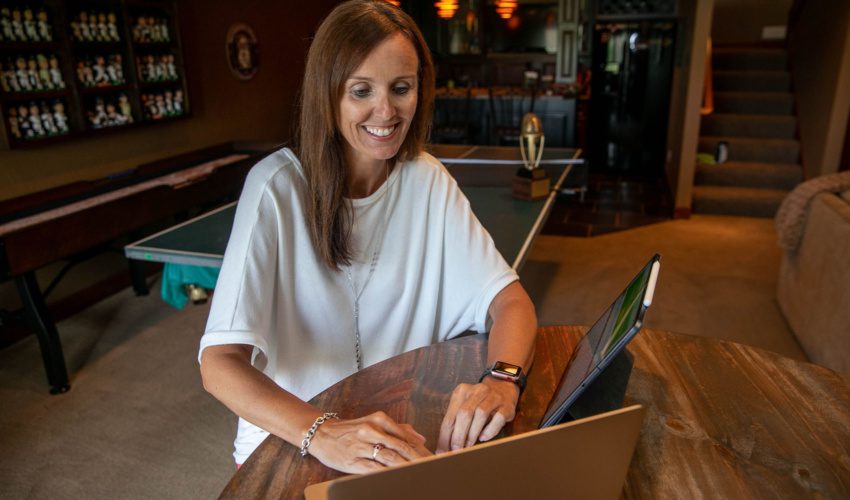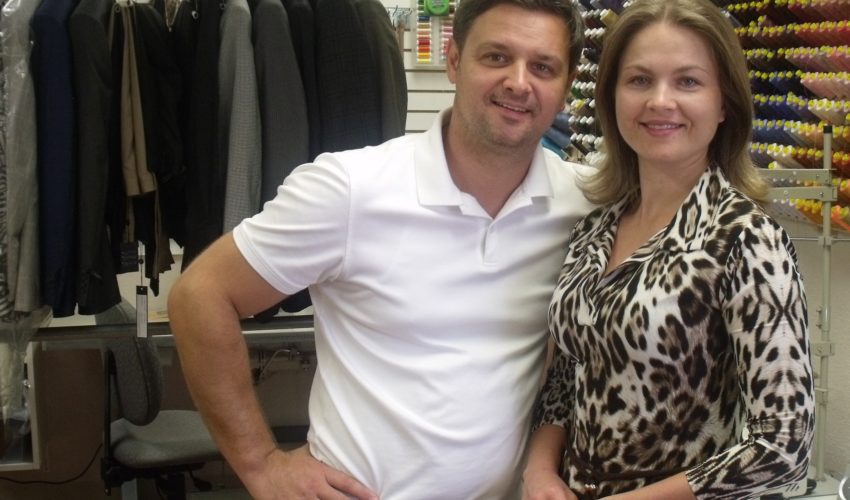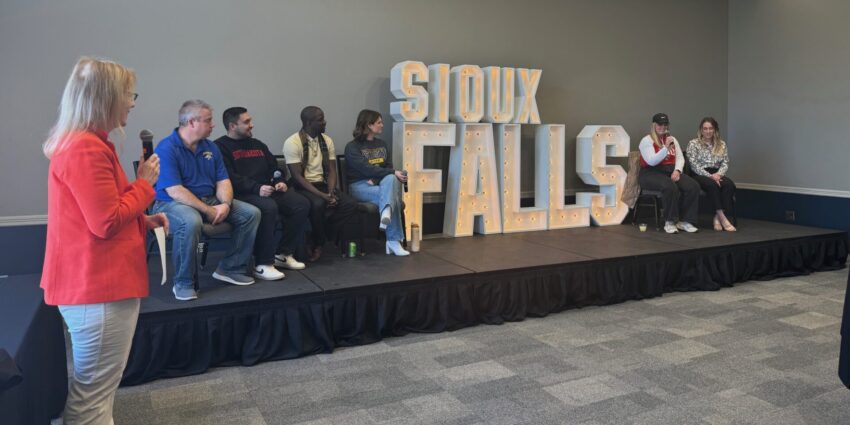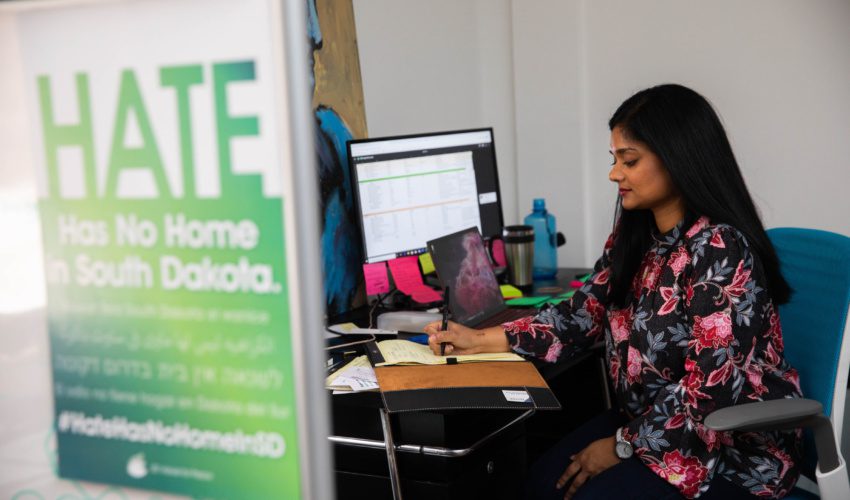Voice for change: Immigration attorney serves as resource, advocate
Feb. 6, 2020
By John Hult, for SiouxFalls.Business
In the course of just a few short years, Taneeza Islam has become one of South Dakota’s most prominent voices for social justice.
The immigration lawyer and executive director of South Dakota Voices for Peace and South Dakota Voices for Justice has testified against anti-Muslim and anti-immigrant bills and helped launch an annual Interfaith Day in Pierre.
She has spoken at 77 training sessions, conferences and community events across the state and helped organize protests like the Families Belong Together march that drew more than 500 people to downtown Sioux Falls to register their distaste for President Trump’s proposed travel ban.
She has spearheaded the production of storytelling videos and social media campaigns designed to give voice to other South Dakota Muslims, immigrants and refugees, and has become a go-to source for media organizations covering stories with an immigration element.
Late last year, her groups were awarded a grant from the J.M. Kaplan Fund to both support rural outreach on Islamophobia and to help fund two new staff members to represent unaccompanied minors in immigration court.
All of which is a bit ironic, considering that Islam initially saw her move to Sioux Falls in 2012 as a chance to slow down.
The Michigan native had several years of civil rights advocacy under her belt at that point, but she also had a young son and recalls feeling “a little burnt out” when her husband took a job at Sanford USD Medical Center that would move the family west.
“I thought I would be a stay-at-home mom for a little bit because we didn’t know a soul here,” Islam recalls from her recently opened office on the campus of First Congregation Church. “Me staying at home … that didn’t work out so well.”
Within a year, Islam applied for a Bush Foundation Fellowship at the urging of a former colleague. She secured funding for a program designed to assess legal services for immigrants in South Dakota and began connecting with churches, interfaith advocates, academia and local school officials.
In 2017, she caught wind of several anti-Muslim legislative proposals in Pierre from the allies she had built across the state.
“They just wanted to let me know, and it wasn’t like I was just going to go ‘OK, good luck up there!’ ” Islam said. “So we started there, and the rest is sort of history.”
Islam tends to credit success to her mentors and partners, but she also recognizes that her skill set and life experience are uniquely suited for her adopted home.
She grew up in Bay City, Mich., the daughter of Muslim immigrant parents who sent her to Christian schools because those schools’ values aligned more closely with their own beliefs.
She was a freshman in high school the first time she was asked to talk about Islam.
“It was right around the time of the first Gulf War,” she said. “We saw all the images, all the stereotypes, the dehumanization of Islam and Muslims. I was literally the only Muslim in my high school of 400. So my social studies teacher was like ‘Hey, would you ever be interested (in talking about Islam)?’ That was a turning point for me personally.”
The attack on the Twin Towers in 2001 was another formative event. Islam was working in New York when the attack took place, in her second day on the job at a nonprofit organization that took children from Harlem, the Bronx and Lower Fairfield to developing countries to build schools.
She already had an interest in social justice, but she knew the attack would be followed by an increase in Islamophobia in places like Bay City, where people are less likely to come across Muslims in their day-to-day lives.
“9/11 really catapulted me into thinking I had a really unique set of life skills: being a practicing Muslim, growing up in a predominantly Lutheran community in a small town in the Midwest. People ask me how I do interfaith work, and I realize that it was something I was primed to do.”
She studied law at Hamline University, a Methodist school in St. Paul with a focus on social justice and service. Her first job after graduation involved investigating claims of workplace discrimination for the city of Minneapolis — often failure of schools or workplaces to accommodate for basic religious practices such as daily prayer or halal meals. She also worked to combat discrimination against Muslims through advocacy and legal action as the legal director for the Minnesota chapter of the Council for American-Islamic Relations, or CAIR.
The St. Cloud School District remains under a mediation agreement, the result of a CAIR-initiated federal discrimination case filed over the district’s response to persistent harassment of Muslim students.
“There was one student, for example, who complained that a teacher would spray air freshener any time she walked into a room,” Islam said.
Fast forward to 2019, and the impact of those formative experiences is evident in the work she has done in her adopted home.
Eighty percent of the bills targeted for defeat by Voices for Peace and Voices for Justice were defeated in the state Legislature, thanks in part to testimony and postcards in opposition.
The grant-funded Hand in Hand program represents a significant expansion of the groups’ previous efforts, one made possible by the demonstrated impact of those efforts in a rural state where immigrant rights rarely have had so strong a voice.
“You hear all the time that people need to do this work in rural America. You rarely hear somebody who’s not only addressing it but doing it very effectively,” J.M. Kaplan Fund executive director Amy Freitag told South Dakota Public Broadcasting in early December. “We found such inspiration in the work that she’s doing.”
On the immigration side, it is work that has never been done in the state before. At least 500 unaccompanied immigrant children have been placed with family members or sponsors in South Dakota since 2014, according to the Office of Refugee Resettlement.
Hand in Hand is the first and only program in South Dakota designed to offer free legal aid to those children, who have no legal right to an attorney for immigration court — regardless of their age. It also aims to help the two dozen families separated at the border who’ve landed in South Dakota.
“We know there’s a 90 percent chance they’ll get deported if they represent themselves,” said Islam, who had four underage clients and a waiting list of 20 families as her new attorney and staff member came on board. “When they have representation, their chances of staying jump to 60 percent.”
Representation is only one piece of the new program, however. It’s also meant to serve as a resource for families weighing their options. Islam said it can be difficult for families to determine if they have a case worthy of the heavy expense of a private attorney because there are no organizations in the state that can offer guidance.
“We want to become that trusted place where people can tell people, ‘Yes, we will take your case, it’s strong, or ‘We’re not going to take your case for these reasons. Feel free to shop around, but if someone does take your case for $8,000, you’re not going to win,’ ” she said.
The effort to offer previously unavailable services to immigrants and educate the Sioux Falls community has backers beyond the New York-based J.M. Kaplan Fund, of course. The groups held their first fundraising gala last month and held an open house for their new office Dec. 4.
Tom Kelley, CEO of Gage Brothers Concrete Products, counts himself as one of the supporters who hopes to see the programs succeed.
Kelley sees his support through the lens of his multicultural workforce. About 40 percent of the company’s employees are of Hispanic origin, coming from more than 20 countries.
“We’re a very diverse company,” Kelley said. “We’ve always embraced that and celebrated that.”
Kelley looks at the number of non-English speakers and immigrants in the Sioux Falls School District and the growing diversity of the adult population and sees a community at a crossroads. Sioux Falls could welcome its new residents, embrace its diversity and reap the workforce benefits, or turn its back and let anti-immigrant groups define its approach to change.
“It’s going to be a huge part of our continued success in Sioux Falls, and we need to get behind this, or we’ll be left behind,” Gage said. “(Taneeza) does an amazing job of educating on these issues. When she speaks, she presents factual information in a way that kind of tears down those walls of fear.”
There’s an effort afoot within the business community to organize a group that will guide best practices on diversity and inclusion, Kelley said. Voices for Peace and Voices for Justice will be a valuable resource as that moves forward, he said, and he believes the community is fortunate to have Islam as a partner.
“She’s been an inspiration for all of us,” he said.
Islam said she has been inspired herself by the response to her message and inspired by the other advocacy organizations that have sprung up alongside hers: Leaders Engaged and Determined, or LEAD, South Dakota, a nonpartisan group designed to encourage civic and political engagement for women and girls, and Transformation South Dakota, which works on behalf of transgender youth, young adults and families in the state.
She also has been moved by support and dialogue from people across the political divide, by the embrace of education on what tend to be viewed as progressive causes in a conservative, rural state.
“All of this is showing that we exist here too,” Islam said. “There might have been a belief that the odds were stacked against us, but people can find hope in these organizations and the support they’ve gotten.”

